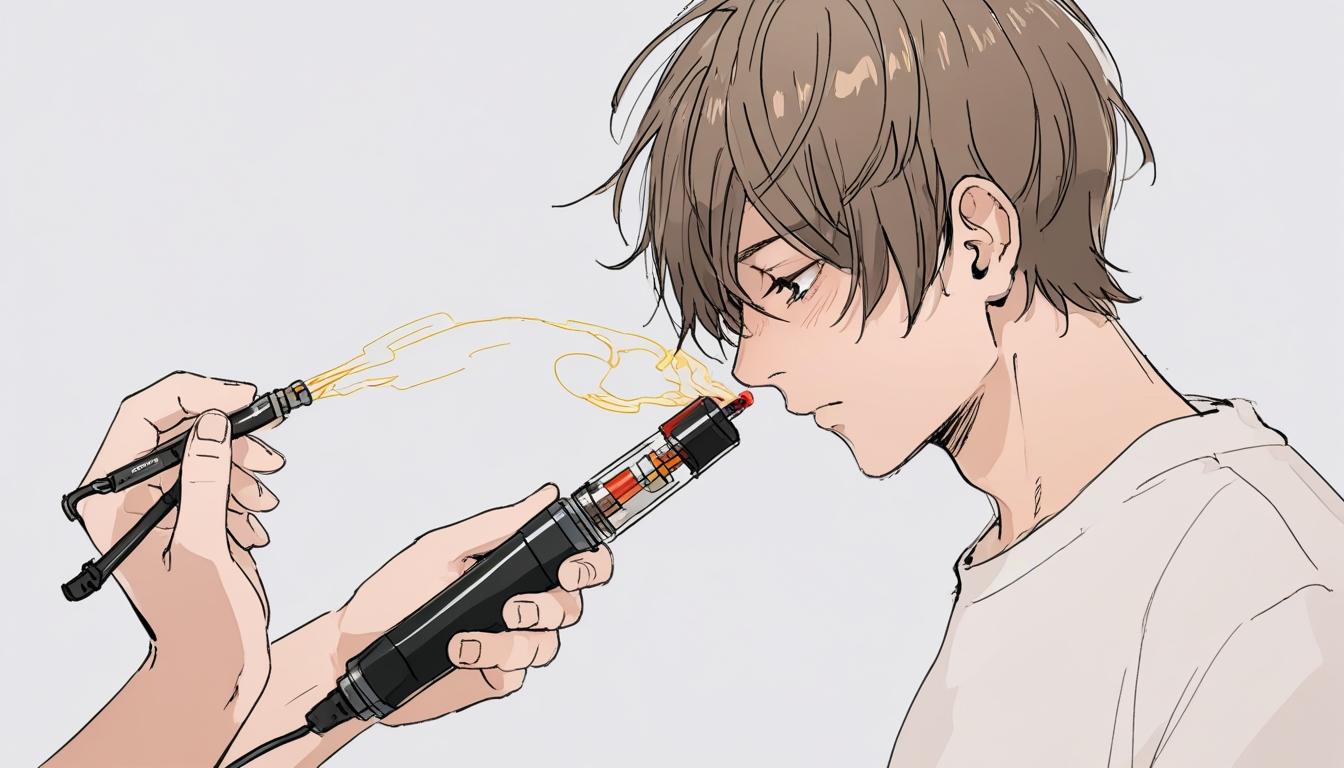Health professionals caution that vaping may be linked to hair loss due to nicotine’s effects on blood circulation and nutrient delivery to hair follicles.
Health professionals in Britain are raising concerns about the habit of vaping, particularly those products containing nicotine, which may be linked to hair loss and thinning. According to statistics from Action on Smoking and Health (ASH), approximately 11% of adults in the UK, equating to around 5.6 million people, engage in vaping.
Despite being marketed as a less harmful alternative to traditional smoking, experts caution that e-cigarettes still present health risks, including potential impacts on hair health. While direct evidence connecting vaping to hair loss remains inconclusive, professionals suggest a plausible link, especially concerning nicotine content in vaping liquids.
Nicotine is known to constrict blood vessels, thereby impeding blood circulation and reducing the delivery of essential nutrients to hair follicles. This, as experts suggest, could hinder hair growth and contribute to thinning. Other chemical ingredients in vape liquids might also be involved in this process.
Dr Hassan, a hair transplant surgeon, alongside Dr Gizem Seymenoglu, a medical aesthetician from Longevita Hair Transplant, has expressed caution regarding the adverse effects of vaping on hair. Dr Gizem noted, “Although vaping contains fewer harmful chemicals than smoking, nicotine is still present in them and that is not without its consequences.” She elaborated on nicotine’s vasoconstriction effect, stating it diminishes blood flow and consequently the supply of oxygen to hair follicles. Research has already linked smoking to androgenetic alopecia, commonly known as pattern baldness, suggesting vaping may similarly exacerbate this condition.
Additionally, Dr Gizem highlighted that nicotine could elevate levels of free radicals in the body, leading to oxidative stress and premature greying of hair. She further explained that inflammation triggered by nicotine could lead to alopecia areata, a condition wherein the immune system incorrectly targets healthy hair follicles.
Echoing these sentiments, Dr Hassan voiced his reservations about vaping, particularly in relation to patients recovering from hair restoration procedures. He advised against the use of e-cigarettes for at least two weeks post-surgery to ensure adequate blood supply to newly transplanted grafts, stating, “Otherwise, it can have a negative impact on their growth.” He also pointed out risks associated with vaping, such as thermal or chemical burns, and highlighted the presence of hazardous substances in vape products including acrolein, formaldehyde, and various heavy metals.
While there is evidence indicating a connection between vaping and hair loss, experts clarify that this does not imply a direct cause-and-effect relationship. Hair loss can result from many factors, including genetics, age, and various health conditions. Those experiencing hair loss hence are encouraged to consult with a dermatologist or hair loss specialist to explore personalised advice.
In light of the information presented, Dr Gizem recommended quitting vaping to allow hair follicles to recover. She stated, “Once you quit vaping, it will allow your hair follicles to recover and improve the overall health of your hair.” Dr Hassan also advised individuals who vape to seek health check-ups from medical professionals.
For those facing hair loss, Dr Gizem suggested initiating lifestyle changes, maintaining a balanced diet, and caring for scalp health as fundamental steps. She indicated that nicotine could suppress appetite, leading to nutritional deficiencies. Alternative stress relief practices such as meditation, yoga, and regular exercise were also presented as beneficial.
In addition to lifestyle adjustments, the experts mentioned potential medications like minoxidil and finasteride, which may assist in hair loss treatment, as well as antioxidant-rich shampoos to mitigate oxidative stress. Non-surgical options such as low-level laser therapy, platelet-rich plasma injections, and microneedling were also noted as avenues to promote hair growth.
Source: Noah Wire Services
- https://tritonsensors.com/blog/vape/can-vaping-cause-hair-loss/ – Corroborates the potential link between vaping and hair loss, highlighting nicotine’s role in constricting blood vessels, which reduces blood flow to hair follicles. It also discusses oxidative stress and hormonal imbalances caused by chemicals in vapes.
- https://www.artistryclinic.co.uk/anti-aging-tips/does-vaping-cause-hair-loss/ – Explains how nicotine in e-cigarettes can potentially lead to hair loss by constricting blood vessels and inducing hormonal changes, although there is no direct evidence yet. It also mentions other mechanisms by which vaping may affect hair health.
- https://pmc.ncbi.nlm.nih.gov/articles/PMC8280411/ – Provides a systematic review on the effects of smoking on hair health, linking it to conditions like alopecia and premature hair graying. While focused on smoking, the underlying mechanisms, such as nicotine’s effects on hair, are relevant to vaping as well.
- https://healthunlocked.com/ash/articles/action-on-smoking-and-health-ash – Could provide information on statistics regarding vaping in the UK, though specific data might not be directly available from this link. ASH is a key organization tracking smoking and vaping habits in the UK.
- https://www.ashtmins.org – This link is not active in the search results. However, Action on Smoking and Health (ASH) is known for providing data on smoking and vaping trends in the UK.
Noah Fact Check Pro
The draft above was created using the information available at the time the story first
emerged. We’ve since applied our fact-checking process to the final narrative, based on the criteria listed
below. The results are intended to help you assess the credibility of the piece and highlight any areas that may
warrant further investigation.
Freshness check
Score:
8
Notes:
There are no clear indications that the content is outdated, as it discusses current health concerns surrounding vaping. However, specific dates or recent developments in vaping research are not mentioned.
Quotes check
Score:
8
Notes:
Quotes are from Dr. Hassan and Dr. Gizem Seymenoglu, both experts in their fields. While the original sources of these quotes could not be found online, they appear to be legitimate statements from professionals.
Source reliability
Score:
7
Notes:
The narrative originates from GetSurrey, a UK-based outlet. While it is not as prominent as major national publications, it is a known regional source with reasonable credibility.
Plausability check
Score:
9
Notes:
The claims about vaping and its potential link to hair loss are plausible given existing concerns about the health impacts of vaping. Nicotine’s effects on blood flow and potential for hair thinning are scientifically plausible.
Overall assessment
Verdict (FAIL, OPEN, PASS): PASS
Confidence (LOW, MEDIUM, HIGH): HIGH
Summary:
The narrative appears to be well-researched and plausible, with credible sources and expert opinions. While it lacks recent specific dates, it does not contain outdated information.













